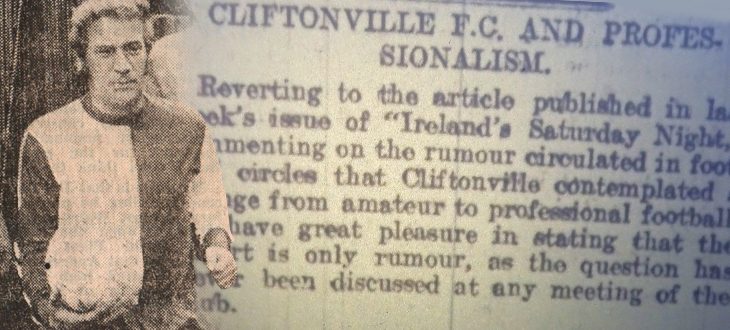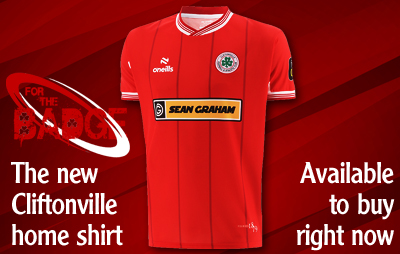Our status update
Regular readers of our Matchday Magazine will know all the facts and figures behind each new week at Cliftonville Football Club, while our Twitter followers are regaled with daily delves into the archives – and today provides yet another significant anniversary.
For it was on June 22, 1972 that Cliftonville FC formally adopted Professional status, as Heritage Development Officer Paul Treanor explains.
Aside from travel expenses and occasional team dinners, no player in the first 93 years of the Reds’ existence received any form of recompense for their services – despite some concerted campaigns aimed at persuading the Club to dispense with their Amateur ethos.
Considered the only appropriate condition for “the gentlemen’s game”, Association Football in Ireland and beyond generally commenced with all Amateur teams, although most – like Bohemians and Distillery – would sooner or later turn pro.
But not Cliftonville.
From committee to coaches and including players, everyone at Ireland’s Oldest Football Club remained firmly of the opinion that their Club, while striving for success on the field, should remain Amateur.
Today may mark 50 years since that outlook was overturned but, like any sizeable organisation, there were occasional sharp differences of opinion on how to progress – and discussion surrounding a change to Professional status goes back further than many might suspect.
The Reds’ League and Cup winning sides of the turn of the 20th century gave way relatively quickly to mediocre results and a distinct lack of trophies.
By 1914, grumbles had started to arise and a lengthy article appeared in the Ireland’s Saturday Night on May 23, debating the issue and asking if it would benefit Cliftonville to adopt Professionalism. The author was firmly in favour of the Reds remaining Amateur, though he recognised times had changed and there were less people playing “for the love of the game alone”.
By the following week, the discussion was over; firmly squashed by the Club, who stated no meeting had ever been held to discuss the matter.
Proceeding decades saw two World Wars and Ireland divided, but Cliftonville remained united against the Professional game. This was helped presumably by intermittent trophy success and a wealth of talented players, particularly strikers.
However, the Second World War years saw lean times return and further talk of the need for change. The Club still retained several hundred Members and a section of this support got together to call an Emergency General Meeting in the Grand Central Hotel on November 26, 1945.
Amid a friendly debate, those who wanted change recognised that they were firmly in the minority and the matter was dropped with no vote taken. The EGM did, however, note what would become an ongoing issue for the Club – namely what could be done to stop other Clubs poaching our talented Amateur youngsters?
The subject next arose in October 1960, when another Ireland’s Saturday Night correspondent asked ‘Should Cliftonville turn pro?’ in reaction to a 17-game run of defeats from the start of the season. Other Clubs debated whether the Reds should even be in the League, but Cliftonville’s response was that those same Clubs didn’t help by continually unsettling our players via the promise of wages.
By 1965/66, with results still grim and little sign of improvement on the horizon, a small section of the support that had remained loyal to the Club were again suggesting there should be change. Some proposed an EGM to discuss the affair, but this was never held.
Again, Ireland’s Saturday Night debated the issue, noting that other Clubs were more tolerant of the Reds’ position and that the Committee were convinced of their future improving while remaining Amateur. Malcolm Brodie and Bill Ireland commended their spirit but added that a “reluctance to turn professional surely means… a constant struggle”.
While working with Amateur players, Manager Jackie Cummings attempted to modernise the Cliftonville’s attitude to adopting what he saw as at least a professional approach to the game. He moved on without the Club’s status being changed and was replaced by Reds stalwart, Kevin McGarry.
McGarry was Cliftonville through and through, but also wholly committed to the Club’s Amateur ethos – one which led to a regular flow of talented young players leaving for other teams and, unsurprisingly, a struggle to attract signings to replace them.
The Club’s Members and Committee were, however, coming to the realisation that expecting the game’s authorities to step in and prevent poaching was a forlorn endeavour and thus, after almost a century as an Amateur side, the Cliftonville AGM of June 22, 1972 accepted a proposal to change the Club’s Constitution to allow the signing of Professional players.
The Club and Manager saw this as a gradual process not to be rushed into and so, while the first game in Cliftonville’s Professional era took place on August 4 – a 3-1 defeat to Ballymena United on a day the team were led out by captain Gerry Kearney (main image) – their matchday squad consisted solely of Amateurs and it was not until November of 1973 that the Reds signed their first pro in the form of Bangor forward Johnny Cochrane.
And the rest, as they say, is history.






